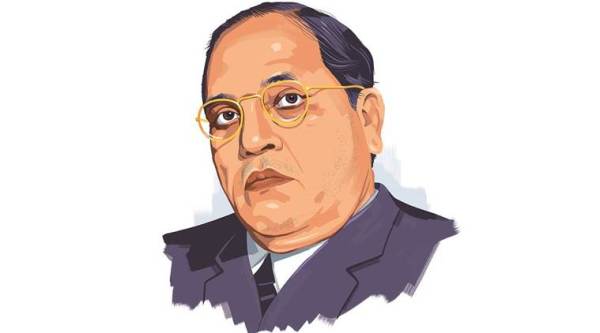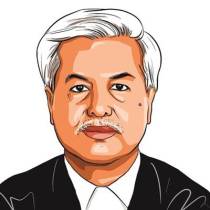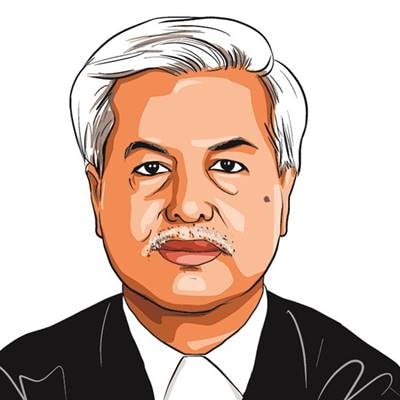Ambedkar’s warning
Emergency has been rightly decried in recent weeks. But Babasaheb’s advice to a young republic on dictatorship must be heeded in post-2014 India.

The 2014 election was indeed a “landslide” for the BJP but founded on bhakti or hero-worship of Narendra Modi. On both counts Ambedkar’s warnings assume significance. (Illustration: C R Sasikumar)
June 25, 1975, was undoubtedly the darkest day for India’s Democracy. In recent weeks, much has been said about the Emergency imposed on that fateful night and the period of two years thereafter. The era has rightly been criticised in various quarters. The debate on the subject may perhaps prevent the imposition of any such Emergency in the future. No one can, however, be sure about that, especially with the weakening of the constitutional institutions created to prevent it. ADM Jabalpur, the darkest chapter in the history of the Supreme Court, may well be repeated. One can only hope and pray that it is not.
This calls for an introspection into the working of democracy, especially since 2014, sans Emergency. On November 25, 1949, after working of the Constituent Assembly for two years, 11 months and 17 days, B R Ambedkar spoke this prophetic warning: “On 26th January 1950, India would be a democratic country in the sense that India from that day would have a government of the people, by the people and for the people… What would happen to our democratic Constitution? Will she be able to maintain it or will she lose it again?”
He was worried as he felt, “Will history repeat itself? It is this thought which fills me with anxiety. This anxiety is deepened by the realisation of the fact that in addition to our old enemies in the form of castes and creeds, we are going to have many political parties with diverse and opposing political creeds.” He, therefore, advocated that “we must be determined to defend our independence with the last drop of our blood.”
He forewarned, “it is quite possible for this newborn democracy to retain its form but give place to dictatorship in fact. If there is a landslide, the danger of the second possibility becoming actuality is much greater.” He warned that “Bhakti in religion may be a road to the salvation of the soul. But in politics, Bhakti or hero-worship is a sure road to degradation and to eventual dictatorship.” In the same speech, Ambedkar implored the nation not to be content with mere political democracy but to make it a social democracy as well. By social democracy he meant, “a union of trinity, meaning a way of life which recognises liberty, equality and fraternity as the principles of life.”
The 2014 election was indeed a “landslide” for the BJP but founded on bhakti or hero-worship of Narendra Modi. On both counts Ambedkar’s warnings assume significance.
We must, therefore, analyse events since May 2014 to grasp whether our democracy is retained merely in form or has given place to dictatorship in fact. We must introspect if the union of the trinity — liberty, equality and fraternity, — exists in a real sense. Has India reached a stage which induces people to prefer a government for the people rather than a government by the people? Are we holding fast to constitutional methods of achieving social and economic objectives?
Sustained attacks on minorities, especially Muslims and Dalits, since 2014 raise serious doubts about the working of democracy. It is no good to wish the attacks away, saying they happened earlier too. The BJP and Narendra Modi promised to change India. Killings by cow vigilantes or attacks on Dalits like in Una are shameful. The world has taken note of them even while recognising India’s GDP growth. What is more troublesome is the status of women in the country. A recent study by the Thomson Reuters Foundation has portrayed a grim picture on this count and compared India to countries like Afghanistan, Syria, Somalia etc. Continued barbaric attacks on women speak poorly about governance in the country. While the so-called VIPs continue to be well protected by thousands of policemen, the common men and women, especially the vulnerable sections, are left to fend for themselves. Fear has gripped the nation, including civil society. Our voice is taken away, by events of commission and omission attributable to those in power or their supporters.
The marginalisation of institutions of governance is a serious concern. The functioning of Parliament and legislatures leaves much to be desired. If the no-confidence motion proposed by the Opposition is not allowed to be debated and voted upon for weeks, can it not be said that parliamentary democracy is a sham? The failure of institutions created to protect public life like the Central Vigilance Commission, CAG and RBI reflects a total breakdown. Demonetisation has been the single biggest economic disaster.
The freedom and liberty of individuals stand seriously eroded with arrests for even critical posts on social media against the BJP and its leaders. Inter-religious marriages are termed by those who do not believe in secularism as love jihad. This negates the very basis of fraternity.
Those in power would like India to be measured on the touchstone of the Sensex and GDP figures, completely forgetting that hundreds of millions of Indians live below the poverty line. Healthcare, environment, education, employment are serious challenges. India ranks amongst the worst performers in the world on social indices. If the Emergency led to many deaths and thousands of arrests, which must be condemned, not one serious word has been spoken about the sustained killing of innocents and stage-managed encounters in UP. The human rights watchdog, NHRC, is silent. The Supreme Court has been slow to react, though it found great reason to order NIA investigation into alleged love jihad cases. Killings of RTI activists and journalists are on the rise. The press is muted, ostensibly on account of government pressure.
Political parties and their leaders speak fondly about Ambedkar but pay only lip service to his philosophy, work and words. Let us remind ourselves of Ambedkar’s warnings and exaltations and strive to preserve our democracy, if need be, with the last drop of our blood.
The writer is a senior advocate and former president of the Supreme Court Bar Association.
For all the latest Opinion News, download Indian Express App
More From Dushyant Dave
- Amicus Curiae Arun Shourie’s new book is essential reading to understand the successes and failures of the Indian judiciary, in particular the brilliance and shortcomings of its…
- Matters of trustJudges must recuse themselves from hearing cases where there is potential conflict of interest ..
- An opaque justiceChief Justice of India is exercising his power to constitute benches, allocate cases in a manner that raises questions about independence of judiciary...








































No hay comentarios:
Publicar un comentario